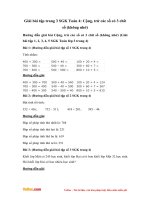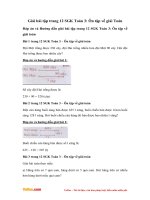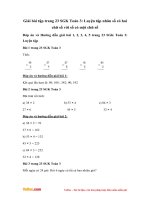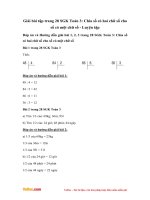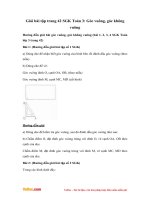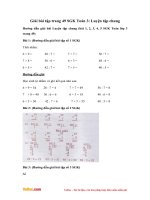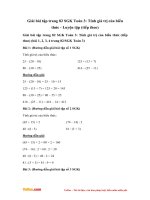BAI TAP 11 Theo SGK Revision 3 Units 79
Bạn đang xem bản rút gọn của tài liệu. Xem và tải ngay bản đầy đủ của tài liệu tại đây (191.49 KB, 3 trang )
<span class='text_page_counter'>(1)</span><div class='page_container' data-page=1>
<b>REVISION 3</b>
<b>(Units 7-9)</b>
<b>I. Pick out the word whose underlined part is pronounced differently from that of the other words.</b>
1. A. population B. probably C. among D. solve
2. A. world B. resource C. support D. floor
3. A. thrive B. those C. throw D. think
4. A. afraid B. offer C. fruit D. frozen
5. A. clarinet B. clarify C. clarion D. clasp
6. A. clothes B. both C. breath D. strength
7. A. cricket B. crowd C. cede D. crash
8. A. service B. reserve C. conserve D. consider
<b>II. Complete the sentences with the appropriate forms of the words in parentheses.</b>
1. The population of the world has been...faster and faster. (increase)
2. Lack of water will stunt the plant's... (grow)
3. People without...had to pay for their own repairs. (insure)
4. The local...are listed in the newspaper. (entertain)
5. You're very...to be alive after that accident. (luck)
6. In cricket, the ball is... overarm. (delivery)
7. Our firm is no longer...in world markets. (compete)
8. I like all her novels, but her latest is...good. (particular)
<b>III. Put in the correct word from the box in each gap. </b>
<i><b>anything nobody everything somebody somewhere nothing</b></i>
<i><b>everywhere something anyone everyone</b></i>
1. She didn't say...about her job when I spoke to her.
2. ... told me that it was a good film.
3. I'm sure you'll find it...in the house if you keep looking.
4. I didn't know...at the party.
5. She said that...was fine and she was very happy.
6. Can I speak to you for a moment? I want to discuss...with you.
7. Unfortunately, I couldn't help. There was ... I could do about the problem.
8. I looked...but I couldn't find it.
9. I rang the doorbell, but...answered.
10...is ready. Let's go!
<b>IV. Rewrite each sentence, beginning as shown, so that the meaning stays the same.</b>
1. Hurry up or we'll be late for the last bus.
Unless...
2. Ellen didn't have much money in the bank, so she was very worried.
If...
3. Anyone who wants to become a doctor has to study hard.
If you...
4. She can't buy the dictionary because she doesn't have enough money.
If...
5. "If I were you, I'd go to the police," she said.
She said...
6. London, the capital of England, has over 6 million inhabitants.
London, which...
7. The job she's applied for is very interesting.
The job for...
8. Fred no longer needed his computer and he sold to his cousin.
Fred sold his computer,...
<b>V. Fill the gaps in these sentences with the correct word.</b>
1. When I got home last night there were four messages on my...
2. You can put the information in the post if you like, but it would be much quicker if you sent it
by ... I'll give you the number.
3. I tried to ... through to you from a public phone
...but the first one was out of order, and the second one I tried only took phone...,
and I haven't got one.
4. If I'm not in the office, you can always reach me on my...
</div>
<span class='text_page_counter'>(2)</span><div class='page_container' data-page=2>
6. If you don't know the number, you can find out from Director
7. A: Did you phone your parents?
B: Yes, I had to make a...charge call as I didn't have any money.
8. I had trouble getting through; in the end I had to go through the.
<b>VI. Write a description of Mid Autumn Festival in Vietnam. Your description should include the</b>
<b>following main points.</b>
<i>• name and time of festival </i>
<i>• purpose of festival</i>
<i>• activities</i>
<i>• things make you like most and the reason(s)</i>
<b>VII. Read the passage carefully and decide if each of the statements is true (T) or false (F).</b>
<b>BOXING DAY</b>
Although this holiday is now celebrated in Great Britain, Australia, New Zealand and Canada, it originated in
England during the Middle Ages. It's observed on December 26th, and is also known as the Feast of St
Stephen. On this day, the churches open their alms or poor boxes which contain donations of money put in
throughout the year. The money is distributed to the needy and other charitable organizations.
It is thought that the name "Boxing Day" originated with the English lords and ladies who used to give
Christmas gifts in boxes to their servants on December 26th. This is also a non-working day that servants are
able to spend with their own families but still get paid.
On this day, friends exchange gifts, while Christmas Day is reserved for families to exchange their gifts.
Although considered a legal holiday in Great Britain, theaters and movie houses stay open. People also
sometimes participate in outdoor sports, horse racing and fox hunting.
1... Boxing Day originated in England during the Middle Ages.
2... Boxing Day is observed on December 26th.
3. ...It's known as the day of labourers.
4. ...The money from the churches1 alms or poor boxes, which is donated throughout the
year, is distributed to the needy and other charitable organizations.
5 ... Servants don't have to work but get paid on Boxing Day.
6. ...Both friends and families exchange gifts on this day.
7. ...In Great Britain, theaters and movie houses close on this day.
8 ... Horse racing and fox hunting are two outdoor sports on Boxing Day.
<b>The End</b>
<b>~~(*)__</b>
<b>KEY</b>
<b>I. 1. C </b> 2. A 3. B 4. B 5. D 6. A 7. C 8. D
<b>II. </b>
1. increasing 2. growth 3. insurance 4. entertainments
5. lucky 6. delivered 7. competitive 8. particularly
<b>III. </b>
1. anything 5. everyone 9. nobody
2. Somebody 6. something 10. Everything
3. somewhere 7. nothing
4. anyone 8. everywhere
<b>IV. </b>
1. Unless we hurry up we'll be late for the last bus.
2. If Ellen had had a lot of money in the bank, she wouldn't have bee very worried.
3. If you want to become a doctor, you have to study hard.
</div>
<span class='text_page_counter'>(3)</span><div class='page_container' data-page=3>
6. London, which is the capital of England, has over 6 million inhabitants.
7. The job for which she's applied is very interesting.
8. Fred sold his computer, which he no longer needed, to his cousin.
<b>V. </b>
1. answer phone / answering machine 2. fax 3. get - box - cards
4. mobile 5. on 6. Enquiries
7. reserve / transfer 8. operator
<b>VI. Suggested Writing.</b>
The Mid-Autumn festival is named "Tết Trung Thu" in Vietnamese.
The Vietnamese Mid-Autumn Festival recounts the legend of Cuội, whose wife accidentally urinated on a
sacred banyan tree. Soon after desecrating the tree, she sat on one of the tree branches and the sacred tree
began to grow and continued until it finally reached the moon, leaving Cuội's wife stranded there. Every year,
during the Mid-Autumn Festival, children light lanterns and participate in a procession to show Cuội's wife the
way back to Earth.
In Vietnam, Mooncakes are typically square rather than round, though round ones do exist. Besides the
indigenous tale of the banyan tree, other legends are widely told including the story of the Moon Lady, and the
story of the carp who wanted to become a dragon.
One important event before and during the Vietnamese Mid-Autumn Festival are lion dances. Dances are
performed by both non-professional children's groups and trained professional groups. Lion dance groups
perform on the streets, going to houses asking for permission to perform for them. If the host consents, the
"lion" will come in and start dancing as a blessing of luck and fortune for the home. In return, the host gives
luck money to show their gratitude.
Most children look forward to celebrating the Mid-Autumn Festival in August. Now, as a grown-up boy / girl,
watching kids perform lion dance and go in parade with colourful lanterns in their hands, I still remember the
happy images of my childhood when I had a good opportunity to enjoy the festive food and also learned things
from my parents such as how to make the party attractive, and when my whole family often enjoyed the feast
in a cozy, sacred atmosphere.
<b>VII. </b>
1. T 2.T 3. F 4.T 5.T 6. F 7. F 8.T
</div>
<!--links-->
